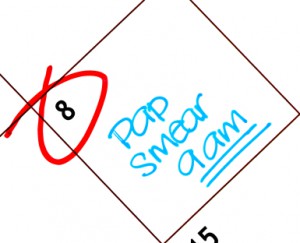
Did you know cervical cancer used to be the leading cause of cancer death in women in the United States? Since the development of the Pap smear by Dr. Papanicolaou (a fellow Cornellian) the number of diagnosed cases and deaths from cervical cancer has exponentially decreased. However, it has not disappeared. January is cervical cancer awareness month; so let’s get smart about cervical cancer.
1) You may not even know you have cervical cancer: Because it may not cause signs and symptoms. Advanced cervical cancer may cause bleeding or discharge from the vagina that you don’t normally experience such as after sex.
2) Cervical cancer is caused by an STD. Most cervical cancers are caused by HPV. It’s the same virus that causes genital warts. HOLD ON! Before you get worried, there are many types of HPV, more than 80 and not all of them cause cervical cancer. That’s why it’s important to have regular Pap smears because the test looks for abnormal cells in the cervix that may be cancerous or pre-cancerous. And even if your Pap test comes back abnormal – DON’T FREAK OUT – there are many reasons why the results might be abnormal. It doesn’t mean you have cancer.
3) Smoking can increase you risk of cervical cancer. Other risk factors for cervical cancer include illnesses that compromise your immune system such as HIV, using birth control bills for more than 5 years, multiple sex partners, as well as giving birth to more than three children.
4) Two screening tests can help prevent you from getting cervical cancer: The Pap test – which looks for atypical cells in the cervix and the HPV test – which looks for the virus that causes these cell changes. The most important thing you can do to help prevent cervical cancer is to have regular screening tests.
5) If you get the HPV vaccine you still need to be examined by your doctor and have regular Pap tests. Start getting Pap tests when you become sexually active or by the age of 18yrs. The CDC recommends women aged 21-65 get regular Pap tests even if you think you are too old or not having sex anymore.
No woman should die from cervical cancer, because it’s preventable and treatable. Talk to your doctor about getting regular screenings for cervical cancer with a Pap test. And if you can’t afford one you can get one for free by visiting: http://www.nccc-online.org/index.php/paptest
Wishing you great health,
Dr. V